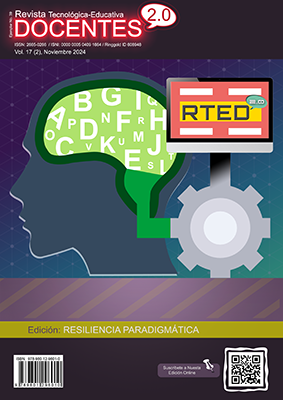International Virtual Education within the Framework of the COIL Project
 DOI:
https://doi.org/10.37843/rted.v17i2.530
DOI:
https://doi.org/10.37843/rted.v17i2.530
Main Article Content
Abstract
Virtual education has experienced exponential growth in recent decades, driven mainly by technological advances and the globalizing process, which allows the interaction of students from different parts of the world and, in turn, to share experiences and develop collaborative academic processes mediated by technology. The main objective focused on analyzing virtual learning environments that promote digital and investigative skills relevant to the Fourth Industrial Revolution. The research was based on the mixed method, positivist logical paradigm, with a social critical approach, non-experimental design, and descriptive type. The focus group technique encouraged discussion and reflection on applying research methodologies, analyzing socio-emotional and multicultural competencies, and advancing pedagogical and leadership skills. Additionally, a survey was administered in Google Forms to quantify students' perceptions of their experience in the COIL project. In conclusion, implementing COIL in academic courses facilitates using technological tools. It promotes students' immersion in virtual learning environments, which contributes to interaction in cultural processes and educational innovation. The global collaboration between educational institutions through COIL also promotes social responsibility and sustainability in training processes.
Downloads
Metrics
Article Details

This work is licensed under a Creative Commons Attribution-NonCommercial-NoDerivatives 4.0 International License.
Those authors who have publications in our journal accept the following terms:
- When a work is accepted for publication, the author retains rights of reproduction, distribution of his/her article for exploitation in all countries of the world in the format provided by our magazine and any other magnetic medium, optical, and digital.
- Authors will retain their copyright and guarantee the journal the right first to publish their work, which will be simultaneously subject to the Creative Commons Acknowledgment License (Attribution-NonCommercial-NoDerivatives 4.0 International (CC BY-NC-ND 4.0)). That allows third parties to copy and redistribute the material in any medium or format, under the following conditions: Acknowledgment - You must properly acknowledge authorship, provide a link to the license, and indicate if any changes have been made. You may do so in any reasonable way, but not in a way that suggests you have the licensor's endorsement or receive it for your use. NonCommercial - You may not use the material for a commercial purpose. NoDerivatives - If you remix, transform, or build from the material, you cannot broadcast the modified material. There are no additional restrictions - You cannot apply legal terms or technological measures that legally restrict you from doing what the license allows.
- Authors may adopt other non-exclusive license agreements to distribute the published version of the work (e.g., deposit it in an institutional archive or publish it in a monographic volume) provided that the initial publication in this journal is indicated.
- Authors are allowed and recommended to disseminate their work through the Internet (e.g., in institutional telematic archives, repositories, libraries, or their website), producing exciting exchanges and increasing the published work's citations.
- Request of withdrawal an article has to be done in writing by the author to the Editor, becoming effective after a written response from the Editor. For this purpose, the author or authors will send correspondence via e-mail: [email protected].
- The author will not receive financial compensation for the publication of his work.
- All Docentes 2.0 Journal publications are under the Open Journal System (OJS) platform at: https://ojs.docentes20.com/.
References
Adell, J., & Castañeda, L. J. (2015). Las pedagogías escolares emergentes. Cuadernos de Pedagogía, 462, 21-25. https://bit.ly/3KmTuhu
Agudelo Viana, L. G., & Aigneren Aburto, J. M. (2008). Diseños de investigación experimental y no-experimental. https://n9.cl/miz4b
Cauas, D. (2015). Definición de las variables, enfoque y tipo de investigación. Biblioteca electrónica de la universidad Nacional de Colombia, 2, 1-11. https://n9.cl/59de1
Creswell, J. W., Plano Clark, V. L., Gutmann, M. L., & Hanson, W. E. (2003). Advanced mixed methods research designs. En Handbook of mixed methods in social and behavioral research (pp. 209-240).
Gallego, A. F., Castañeda, M. É. M., & Fuentes, L. C. (2023). Proyecto COIL: La práctica docente desde la interculturalidad. Ciencia Latina Revista Científica Multidisciplinar, 7(3), 6724-6739. https://n9.cl/xk3a9t DOI: https://doi.org/10.37811/cl_rcm.v7i3.6664
Gallego Hurtado, A. F., & Meneses Castañeda, M. É. (2023). Collaborative Online International Learning: Research and the Development of Soft Skills. Multidisciplinary & Health Education Journal, 5(3), 368–377. https://n9.cl/53pzy
López-Riquelme, G. O., & Delgado-Villalobos, M. (2021). De las emociones sociales a las competencias socioemocionales: evolución, neurociencia cognitiva, desarrollo e intervención. En Montiel-Rojas, TJ (Coordinadora). El desarrollo teórico-metodológico en el estudio de la cognición y el aprendizaje (97-179). Universidad de Guadalajara.
Mitchell, C., & Castle, J. (2005). The instruction role of elementary school principals. Canadian Journal of Education, 28(3), 409-433. https://n9.cl/u7vkz DOI: https://doi.org/10.2307/4126477
Pérez, M. A. C., Vinueza, M. A. P., Jaramillo, A. F. A., & Parra, A. D. A. (2018). Las Tecnologías de la Información y la Comunicación (TIC) como forma investigativa interdisciplinaria con un enfoque intercultural para el proceso de formación de los estudiantes.Etic@ net. Revista científica electrónica de Educación y Comunicación en la Sociedad del Conocimiento, 18(2), 196-215. http://dx.doi.org/10.15517/eci.v1i1.33052 DOI: https://doi.org/10.30827/eticanet.v2i18.11889
Sanabria, I. (2020). Educación virtual: oportunidad para «aprender a aprender». Análisis Carolina, (42), 1. https://n9.cl/dxws1 DOI: https://doi.org/10.33960/AC_42.2020
Restrepo, N. (2022). Proyecto COIL, UNIVERSIDAD 1 (Colombia) y UNIVERSIDAD 2 (México) interculturalidad mediada por pantallas. Chasqui: Revista Latinoamericana de Comunicación, (151), 127-140. https://n9.cl/7k1pu DOI: https://doi.org/10.16921/chasqui.v1i151.4737
Ramos, C. A. (2015). Los paradigmas de la investigación científica. Avances en psicología, 23(1), 9-17. https://n9.cl/vk6ll DOI: https://doi.org/10.33539/avpsicol.2015.v23n1.167






